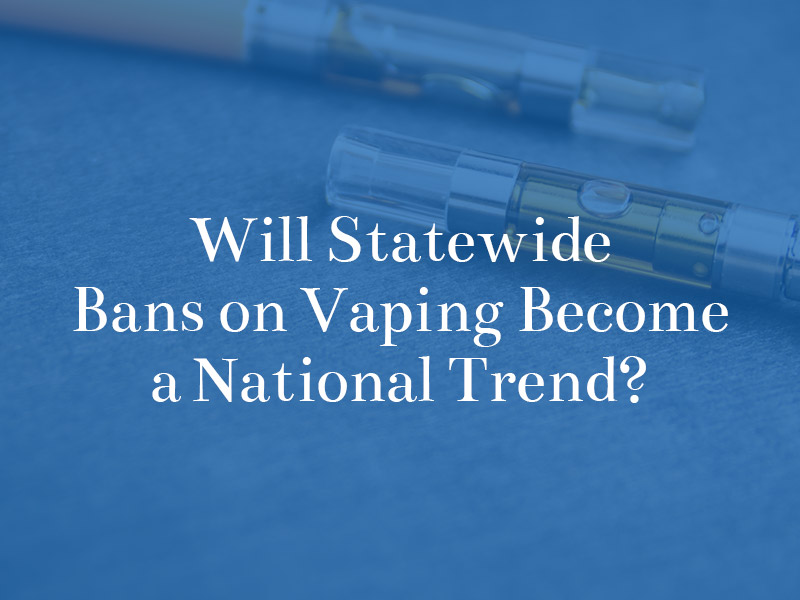A Voice for the Voiceless
The Dunken Law Firm is committed to helping each client find their voice and recover what has been lost.
START MY FREE CONSULTATIONDecember 13, 2019 | Firm News
Public health officials are scrambling for a solution to a recent epidemic involving vaping-related injuries. In November, Massachusetts became the first state to pass a law banning the sale of flavored tobacco and vaping products. As many other states have similar legislation pending, it leaves many wondering whether bans on vaping will become a national trend. Especially since both the short and long-term health consequences of vaping are still unknown.

There have been at least 54 fatalities and over 2,500 people hospitalized in the past few months with severe lung illnesses and other health issues due to vaping. Although marketed as a safer alternative to traditional cigarettes, the dangers related to e-cigarettes are just now coming to light. A spike in vaping, especially amongst teens and young adults has become a primary concern. Mainly since Juul Labs released a discreet USB sized vape pen in 2015, along with fruity flavors that appeal towards youth.
In addition to Massachusetts, there are eight other states that have taken action on e-cigarettes, including: California, Montana, New York, Michigan, Rhode Island, Oregon, Washington, and Utah. The orders have been set up either by governors or emergency rules enacted by state health departments.
In Massachusetts, Governor Charlie Baker declared a public health emergency towards the end of September 2019. This was in response to the outbreak of severe lung disease suspected to be linked to nicotine and marijuana e-cigarettes. The state became the first to ban all sales of flavored and non-flavored vape products. Baker lifted the ban ahead of schedule on December 11 2019, coinciding with the beginning of new long-term regulations. An Act Modernizing Tobacco Control was signed into effect, immediately banning the sale of all flavored vaping products and in June of next year, the sale of flavored tobacco products. The only locations in which flavored e-cigarettes are available for purchase, and use are smoking bars. Any unflavored or tobacco-flavored e-cigarettes that have a nicotine concentration of over 35 milligrams per milliliter of vaping solution can only be in tobacco stores that sell to individuals over the age of 21.
Federally, the Trump administration has delayed a ban on flavored e-cigarettes, as the impact it will have on jobs is being considered. The Food and Drug Administration (FDA) has pushed the deadline for vaping companies to submit their products for rigorous agency review to 2022.
While many agree that something must be done to keep young people away from vaping, some believe that banning e-cigarette products is not the solution.
The argument is that flavored e-cigarettes, including mint and menthol, are marketed towards and appealing to youth. Therefore, by at least getting rid of the flavors, kids may stop vaping. However, there is disagreement in that prohibiting the sale of flavors will not reduce the amount of teens and young children who vape, but actually make the outbreak worse since it is considered cool.
Arguments against a ban also claim that adults who make the switch to quit traditional cigarettes will go back to them.
Evidence from the Centers for Disease Control and Prevention (CDC) has pointed to many of the vape-related illnesses being caused by THC vaping products bought from the illicit market. Therefore, leading people to believe the solution to vaping issues is asking for the federal legalization of cannabis, so that it can be safely regulated with national standards.
People injured by vaping products are filing vaping lawsuits against the manufacturers to seek damages for their losses. For further information regarding vaping injuries, or if you or a loved one believes they have suffered an illness related to e-cigarettes or vape pens, contact our mass tort lawyers at (713) 554-6780 for a free case evaluation.